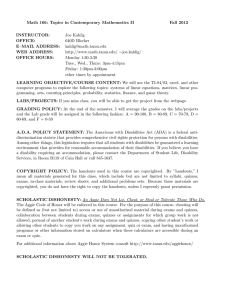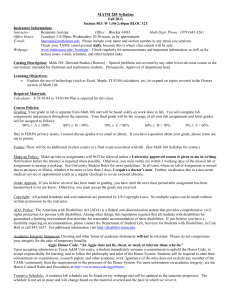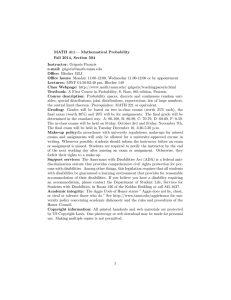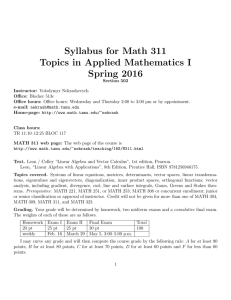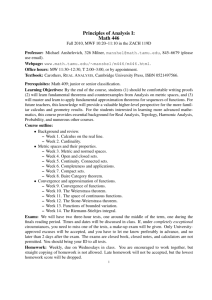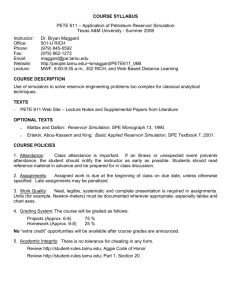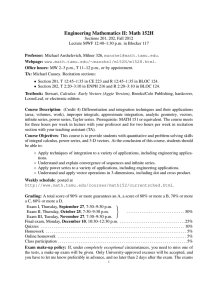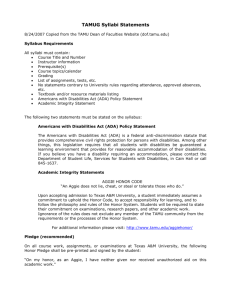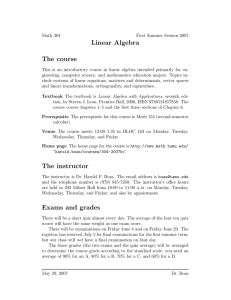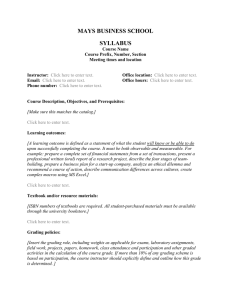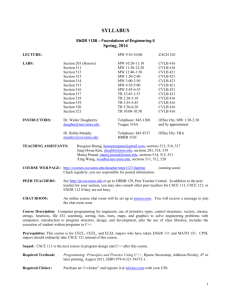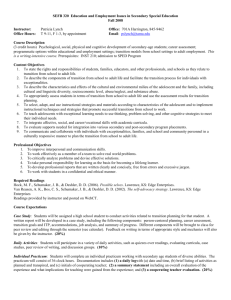Syllabus - Texas A&M University
advertisement
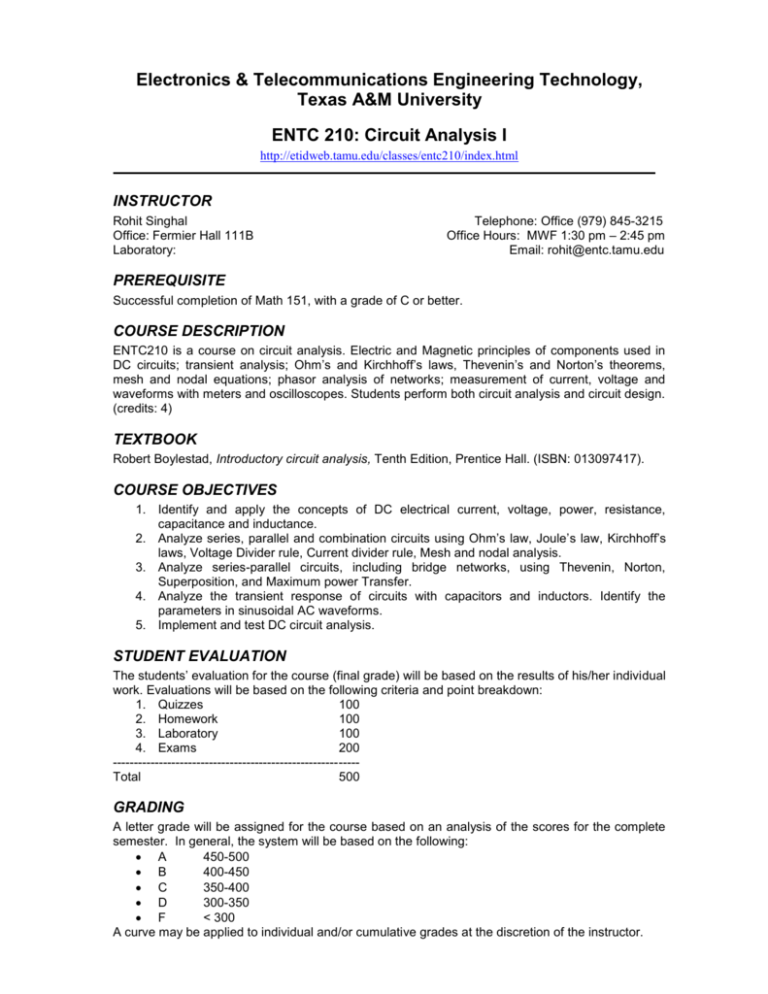
Electronics & Telecommunications Engineering Technology, Texas A&M University ENTC 210: Circuit Analysis I http://etidweb.tamu.edu/classes/entc210/index.html INSTRUCTOR Rohit Singhal Office: Fermier Hall 111B Laboratory: Telephone: Office (979) 845-3215 Office Hours: MWF 1:30 pm – 2:45 pm Email: rohit@entc.tamu.edu PREREQUISITE Successful completion of Math 151, with a grade of C or better. COURSE DESCRIPTION ENTC210 is a course on circuit analysis. Electric and Magnetic principles of components used in DC circuits; transient analysis; Ohm’s and Kirchhoff’s laws, Thevenin’s and Norton’s theorems, mesh and nodal equations; phasor analysis of networks; measurement of current, voltage and waveforms with meters and oscilloscopes. Students perform both circuit analysis and circuit design. (credits: 4) TEXTBOOK Robert Boylestad, Introductory circuit analysis, Tenth Edition, Prentice Hall. (ISBN: 013097417). COURSE OBJECTIVES 1. Identify and apply the concepts of DC electrical current, voltage, power, resistance, capacitance and inductance. 2. Analyze series, parallel and combination circuits using Ohm’s law, Joule’s law, Kirchhoff’s laws, Voltage Divider rule, Current divider rule, Mesh and nodal analysis. 3. Analyze series-parallel circuits, including bridge networks, using Thevenin, Norton, Superposition, and Maximum power Transfer. 4. Analyze the transient response of circuits with capacitors and inductors. Identify the parameters in sinusoidal AC waveforms. 5. Implement and test DC circuit analysis. STUDENT EVALUATION The students’ evaluation for the course (final grade) will be based on the results of his/her individual work. Evaluations will be based on the following criteria and point breakdown: 1. Quizzes 100 2. Homework 100 3. Laboratory 100 4. Exams 200 ----------------------------------------------------------Total 500 GRADING A letter grade will be assigned for the course based on an analysis of the scores for the complete semester. In general, the system will be based on the following: A 450-500 B 400-450 C 350-400 D 300-350 F < 300 A curve may be applied to individual and/or cumulative grades at the discretion of the instructor. ATTENDANCE Regular lecture attendance is recommended, but not required. However, when the student has an unexcused absence for a regularly scheduled lecture or laboratory session, he/she will accept all responsibility for any missed material, announcements, and issued assignments and will receive no credit for missed quizzes or collected assignments. EXAMINATIONS There will be three exams given throughout the term including the final exam. Attendance during all regularly scheduled examinations is required. Make-up exams are not given unless permission is obtained prior to exam day from the instructor or a valid, documented emergency has arisen. ASSIGNMENTS Outside of class work will be assigned. Each student will be responsible for completion of all assigned material even if the work is not collected for grading or graded. All assignments are due at the beginning of the class on the Due Date. Late work will not be accepted without consultation with your instructor and appropriate approval received. Sloppy or disorganized work will adversely affect your grade. QUIZZES A quiz is a short, typically in class, evaluation tool that may be used by the instructor to see if the student has mastered specific concepts. Quizzes may be announced or unannounced. ACADEMIC INTEGRITY The Aggie Honor Code: "An Aggie does not lie, cheat, or steal or tolerate those who do." Academic Integrity is essential for the university environment of academic inquiry and learning and the accurate recognition of each student’s achievement in that endeavor. Collaboration and information sharing are characteristics of a university education; however, academic integrity is violated when student conduct involves dishonesty or ways that give a student an unfair advantage. Academic dishonesty includes the commission of any of the following acts: cheating, fabrication, falsification, multiple submissions, plagiarism, complicity, abuse and misuse of access and unauthorized access, violation of departmental or college rules and university rules on research. (This listing is not exhaustive.) Clarification of these terms is at: http://www.tamu.edu/aggiehonor/acadmisconduct.htm . Students may report violations of the honor code to the Aggie Honor System Office (AHSO), https://aggiehonor.tamu.edu/ahvios/SystemEntrance.aspx or to the instructor. The report procedure is described at: http://www.tamu.edu/aggiehonor/reporting.html . Self-reporting is encouraged and may be considered a mitigating circumstance in the sanctioning phase of a particular case. The homepage of the AHSO is http://www.tamu.edu/aggiehonor/ , and the page with additional student resources is http://www.tamu.edu/aggiehonor/student.html . The following is a highlighting of some of your student responsibilities: 1. You are responsible to be fully acquainted with and to comply with the Aggie Honor Code, Honor Code Rules and Procedures. 2. You are responsible to seek clarification from the instructor if you are in doubt whether an action constitutes academic dishonesty. 3. You are to actively promote academic integrity. Apathy or acquiescence in the presence of academic dishonesty is not a neutral act—failure to confront and deter it will reinforce, perpetuate and enlarge the scope of such misconduct. AMERICANS WITH DISABILITIES ACT POLICY STATEMENT The Americans with Disabilities Act (ADA) is a Federal anti-discrimination statute that provides comprehensive civil rights protection for persons with disabilities. Among other things, this legislation requires that all students with disabilities be guaranteed a learning environment that provides for reasonable accommodation of their disabilities. If you believe that you have disability requiring accommodation, please contact the Department of Student Life, Services for Students with Disabilities, in room B118 of the Cain Hall, or call 845-1637.
